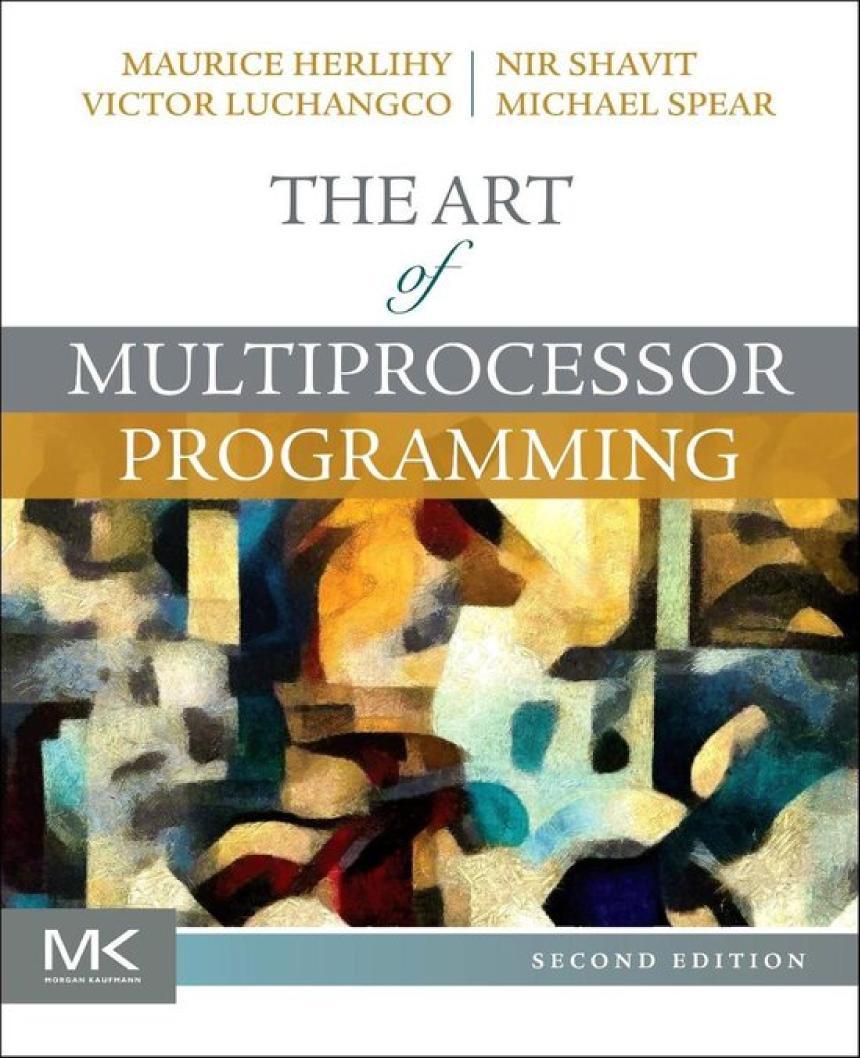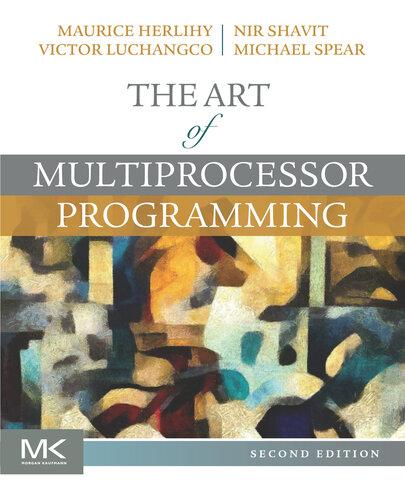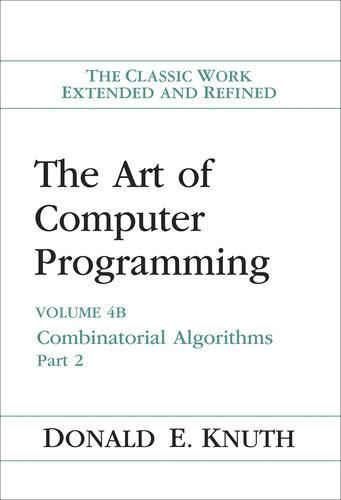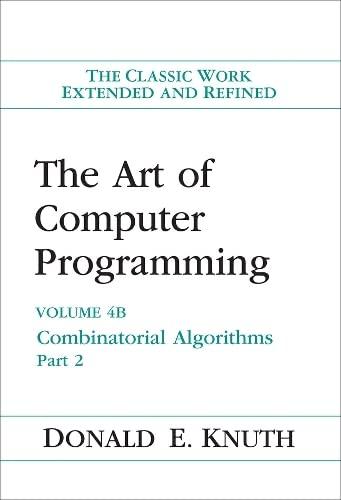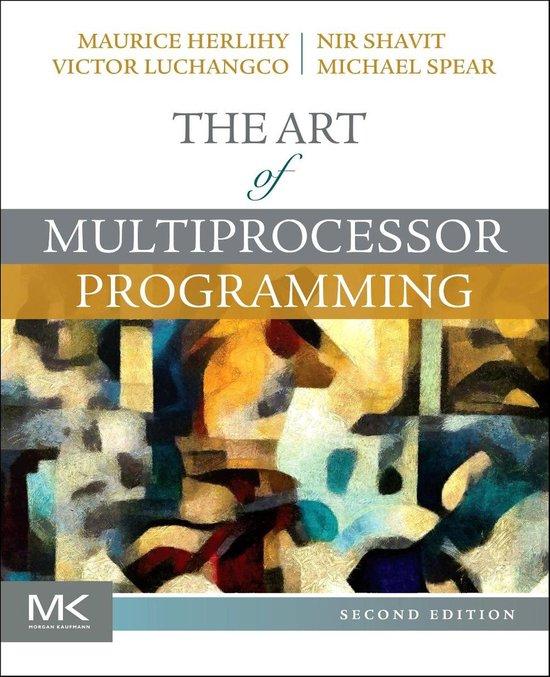TheArtof Multiprocessor Programming
SecondEdition
MauriceHerlihy
NirShavit
VictorLuchangco
MichaelSpear
MorganKaufmannisanimprintofElsevier
50HampshireStreet,5thFloor,Cambridge,MA02139,UnitedStates
Copyright©2021ElsevierInc.Allrightsreserved.
Nopartofthispublicationmaybereproducedortransmittedinanyformorbyanymeans,electronic ormechanical,includingphotocopying,recording,oranyinformationstorageandretrievalsystem, withoutpermissioninwritingfromthepublisher.Detailsonhowtoseekpermission,further informationaboutthePublisher’spermissionspoliciesandourarrangementswithorganizationssuch astheCopyrightClearanceCenterandtheCopyrightLicensingAgency,canbefoundatourwebsite: www.elsevier.com/permissions.
Thisbookandtheindividualcontributionscontainedinitareprotectedundercopyrightbythe Publisher(otherthanasmaybenotedherein).
Notices
Knowledgeandbestpracticeinthisfieldareconstantlychanging.Asnewresearchandexperience broadenourunderstanding,changesinresearchmethods,professionalpractices,ormedicaltreatment maybecomenecessary.
Practitionersandresearchersmustalwaysrelyontheirownexperienceandknowledgeinevaluating andusinganyinformation,methods,compounds,orexperimentsdescribedherein.Inusingsuch informationormethodstheyshouldbemindfuloftheirownsafetyandthesafetyofothers,including partiesforwhomtheyhaveaprofessionalresponsibility.
Tothefullestextentofthelaw,neitherthePublishernortheauthors,contributors,oreditors,assume anyliabilityforanyinjuryand/ordamagetopersonsorpropertyasamatterofproductsliability, negligenceorotherwise,orfromanyuseoroperationofanymethods,products,instructions,orideas containedinthematerialherein.
LibraryofCongressCataloging-in-PublicationData
AcatalogrecordforthisbookisavailablefromtheLibraryofCongress
BritishLibraryCataloguing-in-PublicationData
AcataloguerecordforthisbookisavailablefromtheBritishLibrary
ISBN:978-0-12-415950-1
ForinformationonallMorganKaufmannpublications visitourwebsiteat https://www.elsevier.com/books-and-journals
Publisher: KateyBirtcher
AcquisitionsEditor: StephenR.Merken
EditorialProjectManager: BethLoGiudice
ProductionProjectManager: BeulaChristopher Designer: ReneeDuenow
TypesetbyVTeX
Formyparents,DavidandPatriciaHerlihy,andforLiuba,David, andAnna.
–M.H.
ForNounandAliza,Shafi,Yonadav,andLior,andforLuisa.
–N.S.
Formyfamily,especiallymyparents,GuillyandMaloyLuchangco, andforGod,whomakesallthingspossible.
–V.L.
ForEmily,Theodore,Bernadette,Adelaide,Teresa,Veronica,Phoebe, Leo,andRosemary.
–M.S.
3.3.3Compositionality .............................57
3.4 Linearizability ....................................58
3.4.1Linearizationpoints ..........................58
3.4.2Linearizabilityversussequentialconsistency ........59
3.5 Quiescentconsistency. .............................59
3.5.1Propertiesofquiescentconsistency ...............60
3.6 Formaldefinitions .................................60
3.6.1Histories...................................60
3.6.2Linearizability.. .............................61
3.6.3Linearizabilityiscompositional ..................63
3.6.4Linearizabilityisnonblocking ...................63
3.7 Memoryconsistencymodels .........................64
3.8 Progressconditions... .............................64
3.8.1Wait-freedom.. .............................65
3.8.2Lock-freedom.. .............................65
3.8.3Obstruction-freedom ..........................66
3.8.4Blockingprogressconditions ...................67
3.8.5Characterizingprogressconditions ...............67
3.9 Remarks........................................68
3.10 Chapternotes .....................................69 3.11 Exercises........................................70
CHAPTER4Foundationsofsharedmemory 75
4.1 Thespaceofregisters. .............................76
4.2 Registerconstructions. .............................81
4.2.1SafeMRSWregisters.........................82
4.2.2AregularBooleanMRSWregister...............83
4.2.3Aregular M-valuedMRSWregister..............84
4.2.4AnatomicSRSWregister......................85
4.2.5AnatomicMRSWregister.....................87
4.2.6AnatomicMRMWregister.....................90
4.3 Atomicsnapshots .................................92
4.3.1Anobstruction-freesnapshot ....................92
4.3.2Await-freesnapshot ..........................93
4.3.3Correctnessarguments........................97
4.4 Chapternotes .....................................98
4.5 Exercises........................................99
CHAPTER5Therelativepowerofprimitivesynchronization operations ..................................... 103
5.1 Consensusnumbers................................104
5.1.1Statesandvalence ............................105
5.2 Atomicregisters..................................106
5.3 Consensusprotocols.. .............................109
5.4 FIFOqueues .....................................110
5.5 Multipleassignmentobjects
5.6 Read–modify–writeoperations
5.7 Common2RMWoperations
5.8 The compareAndSet operation
5.9 Chapternotes .....................................120
5.10 Exercises........................................121
CHAPTER6Universalityofconsensus
6.1 Introduction.
6.2 Universality.
6.3 Alock-freeuniversalconstruction..
6.4 Await-freeuniversalconstruction..
6.5 Chapternotes
6.6 Exercises........................................141
PART2Practice
CHAPTER7Spinlocksandcontention
7.1 Welcometotherealworld...........................147
7.2 Volatilefieldsandatomicobjects...
7.3 Test-and-setlocks .................................150
7.4 Exponentialback-off...
7.5 Queuelocks. .....................................156
7.5.1Array-basedlocks
7.5.2TheCLHqueuelock
7.5.3TheMCSqueuelock
7.6 Aqueuelockwithtimeouts ..........................163
7.7 Hierarchicallocks .................................166
7.7.1Ahierarchicalback-offlock. ...................167
7.7.2Cohortlocks ................................167
7.7.3Acohortlockimplementation
7.8 Acompositelock..................................171
7.9 Afastpathforthreadsrunningalone
7.10 Onelocktorulethemall............................180
7.11 Chapternotes .....................................180 7.12 Exercises........................................181
CHAPTER8Monitorsandblockingsynchronization
8.1 Introduction. .....................................183
8.2 Monitorlocksandconditions .........................183
8.2.1Conditions.................................185
8.2.2Thelost-wakeupproblem......................187
8.3 Readers–writerslocks..
8.3.1Simplereaders–writerslock.
8.3.2Fairreaders–writerslock
8.4 Ourownreentrantlock
CHAPTER9Linkedlists:Theroleoflocking
9.3 Concurrentreasoning..
9.4 Coarse-grainedsynchronization...
9.5 Fine-grainedsynchronization
9.6 Optimisticsynchronization
9.7 Lazysynchronization..
CHAPTER10Queues,memorymanagement,andtheABA
CHAPTER11Stacksandelimination
CHAPTER12Counting,sorting,anddistributedcoordination ...
12.3.2Anextendedexample
13.2.1Acoarse-grainedhashset...
15.1.1Concurrentpriorityqueues.
15.2 Anarray-basedboundedpriorityqueue
15.3 Atree-basedboundedpriorityqueue
15.4 Anunboundedheap-basedpriorityqueue
15.4.1Asequentialheap ............................363
15.4.2Aconcurrentheap ............................365
15.5 Askiplist-basedunboundedpriorityqueue
16.4.1Workstealing...............................389
16.4.2Yieldingandmultiprogramming
16.5 Work-stealingdeques.. .............................390
16.5.1Aboundedwork-stealingdeque .................391
16.6
17.1 MapReduce
17.1.1The MapReduce framework......................408
17.1.2A MapReduce-based WordCount application..........410
17.1.3A MapReduce-based KMeans application.............411
17.1.4The MapReduce implementation..................411
17.2 Streamcomputing.................................414
17.2.1Astream-based WordCount application.............416
17.2.2Astream-based KMeans application...............417
17.2.3Makingaggregateoperationsparallel.. ...........419
17.3 Chapternotes .....................................422
18.1 Introduction ......................................431 18.2 Barrierimplementations.............................432
18.3 Sensereversingbarrier. .............................433
18.4 Combiningtreebarrier..............................434
A.2.1Threads ....................................497
A.2.2Monitors...................................498
A.2.3Yieldingandsleeping .........................501
A.2.4Thread-localobjects ..........................502
A.2.5Randomization. .............................503
A.3 TheJavamemorymodel ............................504
A.3.1Locksandsynchronizedblocks ..................505
A.3.2Volatilefields.. .............................506
A.3.3Finalfields.................................506
A.4 C++............................................508
A.4.1ThreadsinC++. .............................508
A.4.2LocksinC++.. .............................509
A.4.3Conditionvariables ...........................510
A.4.4Atomicvariables.............................512
A.4.5Thread-localstorage ..........................513
A.5 C#.............................................514
A.5.1Threads ....................................514
A.5.2Monitors...................................515
A.5.3Thread-localobjects ..........................517
A.6 Appendixnotes ...................................518
APPENDIXBHardwarebasics 519
B.1 Introduction(andapuzzle) ..........................519
B.2 Processorsandthreads. .............................522
B.3 Interconnect ......................................522
B.4 Memory........................................523
B.5 Caches ..........................................523
B.5.1Coherence ..................................524
B.5.2Spinning...................................526
B.6 Cache-consciousprogramming,orthepuzzlesolved .......526
B.7 Multicoreandmultithreadedarchitectures ...............527
B.7.1Relaxedmemoryconsistency ...................528
B.8 Hardwaresynchronizationinstructions ..................529
B.9 Appendixnotes ...................................530
B.10 Exercises........................................531
Bibliography..................................................533 Index.......................................................541
Preface
Inthedecadesincethefirstedition,thisbookhasbecomeastapleofundergraduate andgraduatecoursesatuniversitiesaroundtheworld.Ithasalsofoundahomeon thebookshelvesofpractitionersatcompanieslargeandsmall.Theaudienceforthe bookhas,inturn,advancedthestateoftheartinmultiprocessorprogramming.In thissecondedition,weaimtocontinuethis“virtuouscycle”byprovidingnewand updatedcontent.Ourgoalisthesameaswiththefirstedition:toprovideatextbook forasenior-levelundergraduatecourseandareferenceforpractitioners.
Organization
Thefirstpartofthisbookcoversthe principles ofconcurrentprogramming,showinghowto think asaconcurrentprogrammer,developingfundamentalskillssuch asunderstandingwhenoperations“happen,”consideringallpossibleinterleavings, andidentifyingimpedimentstoprogress.Likemanyskills—drivingacar,cooking ameal,orappreciatingcaviar—thinkingconcurrentlymustbecultivated,anditcan belearnedwithmoderateeffort.Readerswhowanttostartprogrammingrightaway mayskipmostofthissectionbutshouldstillreadChapters 2 and 3,whichcoverthe basicideasnecessarytounderstandtherestofthebook.
Wefirstlookattheclassic mutualexclusion problem(Chapter 2).Thischapter isessentialforunderstandingwhyconcurrentprogrammingisachallenge.Itcovers basicconceptssuchasfairnessanddeadlock.Wethenaskwhatitmeansforaconcurrentprogramtobecorrect(Chapter 3).Weconsiderseveralalternativeconditions andthecircumstancesunderwhichonemightwanttouseeachone.Weexamine thepropertiesof sharedmemory essentialtoconcurrentcomputation(Chapter 4), andwelookatthekindsofsynchronizationprimitivesneededtoimplementhighly concurrentdatastructures(Chapters 5 and 6).
Wethinkitisessentialthatanyonewhowantstobecometrulyskilledintheart ofmultiprocessorprogrammingspendtimesolvingtheproblemspresentedinthe firstpartofthisbook.Althoughtheseproblemsareidealized,theydistillthekind ofthinkingnecessarytowriteeffectivemultiprocessorprograms.Mostimportantly, theydistillthestyleofthinkingnecessarytoavoidthecommonmistakescommitted bynearlyallnoviceprogrammerswhentheyfirstencounterconcurrency.
Thesecondpartofthebookdescribesthe practice ofconcurrentprogramming. Formostofthispart,wegiveexamplesinJavatoavoidgettingmiredinlow-level details.However,wehaveexpandedthiseditiontoincludediscussionofsomelowlevelissuesthatareessentialtounderstandingmultiprocessorsystemsandhowto programthemeffectively.WeuseexamplesinC++toillustratetheseissues.
Another random document with no related content on Scribd:
all my life wanted to visit the poor. I've had to content myself with waiting on a sick aunt, and I've felt all my talents were hidden and wasted. Well, I've visited the poor; but, do you know, my tongue has been dumb. What can I say to help or comfort a mother who is doing her share of wage-earning by days out at farms, a mother who gets from her husband thirteen shillings a week, and has eleven children to bring up and fit out in life upon it? What can I say to a partially paralysed old woman who lies in bed day after day alone with her thoughts, and only a dirty, cracked ceiling and a dingy coloured wall to feast her eyes upon? It makes me wonder, now I have got the desire of my heart, whether that will turn to dust and ashes when I touch it."
"Why do you want to work so much?" said Sidney softly.
"Why? I don't know, except that I've always had a contempt for wastelings, for idlers, for cumberers of the ground. We're put into the world to make it better, aren't we? We have to work our way to heaven. That is my goal. I do think it is. I want to be inside its gates one day. And a lifetime here is only a fragment of eternity, is it not?"
Gavine's eyes were glowing, her heart was in her words.
"Yes," said Sidney. "You want to be a builder with the rest of us."
"I do, I do. I have all the longings for it in the abstract, but I am beginning to doubt myself, to wonder what practical value I am going to be in the world."
"Oh, Gavine dear, you will be all right if you build on the right foundation. But a creed of good works erected on the sand will topple over before they reach heaven. And it is such dreary work wondering if one has done enough, or will do enough to pay for what has already been paid for. Don't
you know from your Bible that eternal life can never be bought—that it is a gift?"
"We must work out our own salvation," murmured Gavine.
"Yes, work it out, but it must be given us first. That is such a misunderstood verse. We work, for love compels more forcefully than the desire to escape death. Do you remember St. Paul's words?—'And now abideth faith, hope, charity, these three; but the greatest of these is charity,' or Love. Christianity is the gospel of Love. Christ earned heaven for you, He showed His love by dying, and by bearing your sins. He could do no more. When God Himself said, 'It is finished,' do you think it needs our puny attempts, even of a lifetime, to add to His scheme of salvation? We can show our gratitude and love to Him by a good life and good work; that is our absolute duty, but when every act pleases the One you love, it is such happy work."
There was a little silence. Then Gavine squeezed Sidney's arm, and there was a sound of tears in her voice.
"Oh, Miss Urquhart; I have never had anyone to talk so to me before. Show me how to love Him."
GAVINE stayed to dinner, and afterwards Sidney retired with her over the drawing-room fire, where they had the talk that remained with Gavine for the rest of her life.
Major Urquhart was, of course, only too delighted to take her home, and Mrs. Norman welcomed him in so warmly that Gavine escaped to bed unnoticed. Sleep did not come very soon to her. She had always been a deeply religious girl, but there was now a quickening thrill and fire in her soul that had never been there before, for she had been shown the foundation stone, and simply as a little child she had planted herself upon it.
She opened her window and gazed up into the still blue heavens above her.
"What does anything matter?" she exclaimed in the rapture of her heart's adoration for the One who had become the centre of her life. "If I never get any slum work at all, I can find work to do at home. Wherever I am, I can be working, for it is just doing His will and following Him. That is what makes Miss Urquhart so contented and happy in her life. I wondered at it before. Now I understand."
To Sidney, that evening talk had been a tremendous lift and cheer. She had kept a bright face, but her heart had been saddened and fearful over her future. She was not a perfect woman by any means, and in pointing the way to another wayfarer, she had taken a firmer foothold herself. So the next day dawned for these two with a brighter outlook, and the little frets and chafings of life hardly touched them.
That afternoon the Admiral called Sidney to him.
"I've been reading about Neville's doings. Have you seen the paper? He is making things hum out there. I knew
he would."
Sidney sat down at once by her father's side.
"Do read it to me," she cried. "I have neither heard nor seen anything."
"You had better read it yourself. He has been turning out a native collector or commissioner, and the place is up in arms. He found him out in 'bribery and corruption,' the usual thing with a native official. But this particular man was the son of a big gun out there, and I'm afraid he has raised a hornet's nest about his ears. What with the depredations of native robbers, and the corruption of many of the officials, those small outposts are not a treat, I can tell you. I know a little about them. And these Radicals in Parliament are, of course, thrusting their noses into the pie, and calling out that colour and the rights of the native are not being respected."
Sidney took the paper in her hand with beating heart. Why she was so agitated she could hardly explain to herself. She had written to her "fellow builder" only a week previously, one of her gay, sweet letters, ending with some earnest bracing words of cheer and stimulation. As she saw his name in print, and his actions criticised and questioned in the House, the warm colour crept into her cheeks. She read an extract from a letter of his which was quoted: "I will sooner resign my post than wink at a system of job and corruption." And she looked up at her father with glowing eyes.
"What a pity we have not a few more men like him, dad."
"I'll write him a line of congratulation," the Admiral said, turning to his writing table. "He is standing alone at
present; but the Viceroy will back him up. People at home are so terribly afraid of the natives rising that they think nothing of recalling a man who is doing his simple duty. I know all about it. Those who have travelled round the world as I have, see a little farther than these country bumpkins who push themselves into Parliament, and think that any trouble with natives means unjust oppression on our part."
"I hope they will give him a free hand," Sidney said. "He told me he had been born under an unlucky star. It would be rather hard to recall him. They couldn't do it, could they?"
The Admiral shook his head.
"He'll win his way sooner or later. I always said so, and why not now?"
In a few days' time they saw from the papers that troops had been called out, and a horde of fanatics had swept down from the hills to join in the mêlée. Sidney watched for the news breathlessly. She was astonished when Gavine appeared one morning and begged to know if the daily paper had come.
"We don't get ours so soon as the Admiral, and I want to see something in it."
"It has not come yet. Sit down and wait. It won't be long now. What is it you want to see, Gavine?"
"Oh, only the account of this row on one of the Indian frontiers."
"Are you interested in it?"
"Very. I know someone out there."
Gavine was blushing. Sidney looked at her in amazement.
"Do confide in me. Father and I are interested too, in someone out there. Do you know Mr. Neville?"
"No, but I've heard of him."
The girl hesitated a little, then, meeting Sidney's affectionate and sympathetic gaze, she faltered.
"It's a young fellow who used to live close to my aunts in the north. We grew up together. We aren't engaged. I did not want to be, but I promised if he still wanted me in three years' time from the day he went out, I would think about it. I wanted him to make his way first. He has been out there two years now, and he writes to me constantly. I feel I could go down on my knees before Mr. Neville, if I were ever to see him, and thank him for all he has done. Because George could not keep straight, and I have suffered tortures as I gathered it in his letters. He is not a weak character, I should not care for him if he were; but he is one of those happy generous natures who love their fellow-creatures, and are too simple to suspect guile in anyone.
"He was essentially a home boy. His mother was a widow, and died just before he went abroad, so he has no home or home ties to keep him straight—only me. And he did struggle and try so hard when he went out there, but, as far as I can make out, there wasn't a single soul who gave him a helping hand. Everyone dragged him down. And I felt a month or two ago as if I had completely lost him. He had left off writing for five months. Then he wrote again. Such a letter, and such a confession of the past!
"But he had been taken hold of by Mr. Neville, and he said he felt he could die for him. I little thought how those
words would nearly come true. I heard from him two days ago, and he was full of all this that is coming out in the papers, only, of course, he tells me much more. Do you really know Mr. Neville well? How awfully strange. I think he must be a splendid man—a regular hero."
"He was staying down here before he went out," Sidney said, trying to speak calmly. "He is a cousin of Miss Pembroke's. Do tell what you have heard. We are so—so interested in him, and all that is going on out there."
"Oh, George has been full of it. He has told me of all the improvements Mr. Neville has made, and how he has absolutely alone and unaided attacked all the abuses in the place, and pulled things together, and made a clean sweep of the scoundrels and rogues. But, of course, there has been a section dead against him, and furious with him for stopping so much of the drinking and gambling, so they have made mischief and stirred up the natives; and then he was the cause of the native collector at the neighbouring station being removed, and that was the last straw, and one night—the night before George wrote; he was dining with him fortunately a crowd of natives surrounded his bungalow. His servants ran away, and the ringleader called out for Mr. Neville to show himself. He didn't want any calling, for he was out on the steps in a moment, and one man with a revolver dashed forward and fired full in his face. George was quicker still, and sprang forward and struck up his hand as he fired, so the shot went clear over the bungalow. He stood there before them bareheaded, with his hands in his pockets, and smiled at them, George said.
"'Next man!' he cried. 'I have no firearms about me, and am a good target.' And not a man moved. Then he spoke to them, and George said his speech was simply wonderful. He talked to them like a father might to his
children. He told them they had only one life to live down here, and it ought to be a clean life. He was going to help them up, and not down. And then he reasoned with them and pleaded with them, and he reduced some to tears, and some pressed forward and prostrated themselves before him, and the scoundrels slunk away. George said it was like listening to a second Gordon, and Mr. Neville wound up by talking of the Indian and British Empires, which would rise or fall together, and he impressed them with the righteous power of a just nation. Oh, I am not telling it well, but I cried over the letter. It was all so splendid, so inspiring."
Sidney's eyes were moist too, and her heart beating strangely. Why should she be so moved? she asked herself. But, womanlike, she evaded—even to herself—the answer.
"Did he say anything about the troops coming down?"
"Yes; he said that was a very big blunder. Some wellmeaning but mistaken fool had written off for them. Mr. Neville told George there would have been no more trouble if the troops had not arrived. As George was writing, he heard that the natives had risen in the hills. And that is why I'm so anxious to get news. I know George will be in the thick of it, for he refuses to leave Mr. Neville's side, and he is not the man to stay inactive."
"Here is the boy with the paper," said Sidney, and she darted out into the hall to get it. Together they bent their heads over it, but there were only two lines, saying that there had been sharp fighting, but the natives had been repulsed, with a few British losses. "Particulars would follow."
"They would have said if any officers or Commissioners had been wounded," said Sidney. "Now come and tell my
father your news, Gavine. He will be so interested. It is such an extraordinary coincidence that you should know someone out there too. How quiet you have kept it."
"Well, he is only a friend," said Gavine shyly. "Nothing more at present. You can't wonder I like Mr. Neville, after all he has done for George."
She accompanied Sidney to the Admiral's study, and there told her story again. The Admiral was delighted.
"He'll do. I always said he'd do. And this fighting is nothing at all. It will clear the air and show that we are in earnest over our out-stations."
When Gavine had gone Sidney went straight to her writing-desk and wrote:
"MY DEAR MR. NEVILLE,
"You don't know what a state of excitement we have been in over your small corner. Father and I have watched for the daily papers eagerly; but how much they omit and how much they misrepresent! Do sit down when you have time and give us a detailed account of all your doings. I have been hearing a lot about you through a girl who has come here lately and is a great friend of young George Lockhart's. You can understand what we have heard and how it has stirred us. How I wish I could peep through a telescope at you. I should like you to know Gavine Norman. She is such a fine splendid girl. And what you have done for George Lockhart, you have done for her. She
was so miserable about him before you went out. Oh, how often I wish I were a man to go out into the world to do and dare! But it is good to be friends with the one who does it. And you must never forget that any detail from your seat of war is welcome. Father is stroking himself down with great complacency, saying he knew, and he foretold, and his intuitions were correct that you would do as you have done.
"Things have not gone on exactly the same since you have left us. Fresh personalities have come upon the scene, and have brought with them much interest, some conjecture and alarm, and a good deal of unrest. I feel as if I am on the brink of an earthquake, an upheaval that will lift father and myself right out of our old home and plant us down in some strange soil and surroundings. It may be a false alarm. If it is not, I will tell you where we are taken. Monnie tells me that my creed is, 'I shall never be moved.' Have you got your foundation so firm underfoot that you can give your assent to that? My earthquake is a very earthly one. I think—in fact, I know—that my foundation is immovable, so if one's inner man is anchored 'sure and steadfast' to it, it does not matter about the outer man, does it?
"I think you are going ahead with your building faster than I am. But Empire building is a big thing. I do congratulate you with all my heart upon your success. You see, we have heard more of your doings through George Lockhart than through yourself.
"This is not a very interesting letter, but it will at least let you know that we think of you and talk of you, and look forward to your letters. I am always going to sign myself
"Your fellow builder, "SIDNEY
URQUHART."
Sidney put her pen down when she had signed her name with a little sigh.
"Oh, how tied a woman is!" she exclaimed. "How she has to keep back all natural expressions of pleasure in what a friend does and says. My heart is too full of his heroism to trust my pen. It would run away with me. I feel I would like to see him. Letters are so stiff, so unsatisfying."
Then she relapsed into dreams—dreams which she had long thought dead, but which kept her wrapped in sweet oblivion of time and surroundings and brought a light to her eyes and a flush upon her cheeks. When she roused herself at last, she laughed at herself.
"I ought to know better than to waste my time in such silliness."
And she went downstairs and occupied herself with so many household duties that further dreams were impossible.
The papers for the next few days brought no fresh news except that the British had a complete victory over the rebels, with fifteen dead and thirty wounded. Then one day the names of the wounded were given, and amongst them
was Randolph Neville, "slightly wounded in the shoulder." A letter arrived from him later. It was as follows:
"DEAR MISS URQUHART,
"I am enjoying a lull after a storm. I don't know how much you may have seen in the papers from the telegrams sent, but we've been having rather a busy time here. I know I am an unknown quantity, but I suppose I have a better opinion of my powers in dealing with these natives than have my superiors, and I honestly think you would have heard nothing about us, if I had been left alone. However, there was a slight disturbance over the ejection of a scamp, and troops came rushing down; and then we had a bit of a shindy, as one of the hill tribes joined in. Now we are quiet again, and I have to nurse my right shoulder, which received a bullet at rather too close quarters to be pleasant. Young Lockhart quite distinguished himself. He will get promotion soon, if I have any influence at headquarters.
"Well, how are things going down your way? Your letters do more to keep me going, and keep me going cheerily, than any other mortal thing. How do you manage to instil such a breath of sweetness and vigour between such thin sheets of paper? Last night I dreamed that you were sitting in the shadows here singing to me. It was a hot, breathless night, but I could smell the syringa bushes in your garden shrubbery, and I seemed as if I were enveloped in your atmosphere. Some time ago I was
cursing the gift of memory; now I am blessing it, for it brings me you. Am I receding farther and farther in the cells of your memory? But no; you are more than good in corresponding with me, and I will not think so meanly of your friendship, which you gave so frankly and warm-heartedly. Excuse this scrawl; my right arm is in a sling.
"Remember me to the Admiral. I would like a chat with him out here. I enjoyed the society of the soldiers whilst we had them. I put up the colonel and major in my quarters, and discovered that the major had been in my old regiment years ago. We had quite a gossip over old times. I always feel a pang when I think of my exit from the Service. Fighting in politics is such a different thing from real warfare.
"Now they have gone, and I am left undisputed king of my domain, with piles of correspondence to wade through, and reports to write to about twenty different departments. I am neither fish nor fowl, civilian nor soldier, and, ergo, I have a variety of masters to serve and can manage to please none. The chances are that I may come back like a bad halfpenny to old England. What would your welcome be like, I wonder? It opens a vista of conjecture and possibility to me. Well, I shall for the present go on with my building, and if I can get this spot wholesomely sweet before I leave it, I shall have done as much as I expected to do.
"Your rather weary fellow builder—
"RANDOLPH NEVILLE."
Sidney read the greater part of this aloud to her father.
"Men always take things so lightly," she complained. "Now, if that had been a woman who had written, we should have had the fighting in awful reality. She would have drawn a vivid picture of the whole; but Mr. Neville dismisses it in a few words."
As she was speaking, Gavine was ushered into the room. She brought up a letter from George Lockhart which she had received by the same mail, so Sidney had her desire given her, for George gave many details about his chief, and told exactly how he was shot in carrying a wounded soldier to safety.
"All has quieted down," he wrote, "and the colonel saw that no more troops would be needed. Mr. Neville holds the whole place in the hollow of his hand. The natives were rather shy and uncertain of him before; now they look upon him as a god. He has gradually and quietly got them in hand, and this upset has brought matters to a crisis and shown them that he will be master. But I believe he has had some bad moments himself, when he was expecting a recall. In fact, all one day wires were hard at work undoing slanderous reports. He never says much, but he let out to me when we were having a pipe together that if he was not allowed a free hand, and if they were
suspicious of his motives at home, he would clear out at twenty-four hours' notice. And he would, too. And the Government would lose one of the best men out."
"I thought you would like to hear this," said Gavine simply. "George is very enthusiastic over Mr. Neville, but he knows him better than anyone else."
Sidney thanked her warmly for her news, and for some time the Admiral and the two girls discussed the situation. Then Sidney asked Gavine about herself. There had been delay about her going up to town, and she had not yet left her mother, but she was hoping to leave the very next day.
"I never thought I should be so sorry to go," she confided to Sidney as she stood on the terrace outside the house wishing her friend good-bye. "I felt I should miss Jockie, but I shall miss you a thousand times more."
Sidney did not laugh at her girlish infatuation, she kissed her tenderly.
"We will write to each other, and you must come and stop with us next time you visit this part."
For an instant Gavine looked as if she were about to say something; then she checked herself, and it remained unsaid.
Yet, as she went down the drive a few minutes later, she murmured to herself:
"I wonder if she guesses. I could not tell her my fears, for, after all, I may be mistaken, and I am not the one to talk of my own mother."
CHAPTER XIII
THE MAJOR'S NEWS
THE very next day Jockie burst in upon Sidney like a whirlwind.
"Oh, Miss Urquhart, haven't you a contempt for women who scratch each other? Mrs. Norman and I have been doing it with smiling faces, and I feel disgusted with myself, and yet I would do it again gladly if she were here to provoke me. Do let me confess to you. First of all, of course, you know that the Major and she are on the eve of making their engagement known?"
"Oh, Jockie!"
"Yes; and I ought to cut off my right hand, for I, and no other, have brought it all to pass. If I once begin confessing, there will be no end to it. You remember that Austin got the wrong letter sent to him, and it had the effect of choking him off? Well, one afternoon I was cycling down to see if I could get hold of Gavine, when I saw Mrs. Norman flying up the road without a hat on, and looking perfectly distracted.
"'What is the matter?' I said.
"'Oh,' she gasped, 'I want to catch the postman. I have enclosed a letter in a wrong envelope.'
"'I'm afraid you're too late,' I said. 'I passed the postman ages ago.'
"'Oh,' she cried, 'it is so important; I must try to get it back from the post office. Could you—would you help me. You could cycle in a few minutes to the office. A mile would be nothing to you.'
"'All right, I'll go,' I said, and I cycled off. Neither she nor I thought of mentioning the address or the letter, so when I got to the post office I was quite in ignorance. But the postman was very obliging. I caught him up before he got to the post office, and he opened his bag and took out two letters addressed in Mrs. Norman's writing. One was to Austin, the other to Whiteley's, in London.
"For one moment I hesitated, and then I knew that she would not be in such a ferment over a tradesman, and I felt that if Austin got the letter it might possibly show him what a fool he was, and so I deliberately took Whiteley's, and slowly made my way back to the cottage. Now don't be disgusted with me! I thought the end would justify the means. I really almost felt sorry for her when I saw her face. But she couldn't say much, except that I had brought the wrong letter, and that in her agitation she omitted to tell me which one it was.
"Now I see what I have done, and I have brought trouble on the one I love best. But I didn't realise that if it was not Austin, it would be the Major. Of course, since Austin has gone off, the Major has been down there every day, and Gavine has tried her utmost to keep out of their way, but was unfortunate yesterday, as she surprised them in the midst of an embrace. Oh, perhaps I had better not go on. I am paining you."
Jockie's blunt speech was like salt on a raw wound to Sidney's soul. She could not bear hearing of her uncle's infatuation for the widow; though she was conscious of the truth of it. But she said very quietly:
"I should like to hear all you have to tell me."
"Well," said Jockie, "I come back to where I started. I had to take a message about some committee meeting to Mrs. de Cressiers this afternoon. Uncle John sent me. I found Mrs. Norman there before me. She had evidently been telling Mrs. de Cressiers how she had refused Austin, for as I came in she was saying:
"'I will not say that I did not think of you in it, dear Mrs. de Cressiers, for I knew that his continued absence from home must be most trying to his father. And I thought the sooner it was stopped the better. The whole thing was foolishness. I regarded him, and shall always regard him, as I should if I had a son of my own. But young men are so rash and headstrong that they cannot, and will not, see themselves as others see them.'
"Then I came in and gave my message. Mrs. de Cressiers is always nice to me. I like her. Then Mrs. Norman asked me if I had been with Gavine.
"'I see so little of her that I am afraid I shall not miss her so much as I ought when she leaves me. It is quite a characteristic of the young people nowadays, is it not, Mrs. de Cressiers, to be happiest away from home with strangers? If girls have parents, they will not be content to live with them.'
"I knew she was hitting at me, as well as at Gavine, so I said:
"'It depends on the parents, Mrs. Norman. Parents nowadays are always on the look-out for a second marriage, and find their daughters in the way. Gavine and I have had pretty much the same experience.'
"Mrs. de Cressiers was quite shocked at my rudeness.
"'Respect to parents is dying out,' she said with a little sigh. 'I am afraid Austin does not care for his home.'
"'He will be different now when he comes home,' I said consolingly. 'He told me he was thankful he had had his eyes opened, for he had been the biggest fool out. And he means to be a model son, Mrs. de Cressiers. We had a lot of talk together at Christmas time. It will do him good going abroad.'
"Then Mrs. Norman began to talk about the parish, and how unfortunate it was that Uncle John had no woman to advise him, and how many mistakes there seem to have been made this Christmas, and then I said—"
"My dear Jockie, please spare me any more. It is not interesting or edifying, and if you are going to indulge in such petty, spiteful retaliation with people whom you do not like, you will do yourself more harm than you will do them."
Sidney spoke severely. Jockie kissed her impulsively.
"Don't be angry with me. She brings out all the evil in me. You always make me feel ashamed of myself. And I honestly own that it was a beastly trick to play her when I took back the wrong letter, but I went down under the temptation."
"I could not have believed you would do such a thing," said Sidney, still unappeased.
"No; scold me well! I'm awfully repentant. But if I went and confessed it to her, she would be still more furious, would she not? For, of course, she does not know I saw the other letter. I could tell her I knew all about it. Shall I?"
"Jockie, are you an imp in disguise? Do you think you are fitted to teach Chuckles?"
"No, that I'm not."
And this time Jockie spoke quite humbly.
"But, oh, Miss Urquhart, I have done you an awful lot of mischief. Gavine says her mother told her that she was thinking of marrying again, and she said that the Major was an honourable kindhearted man. I should hate to have Mrs. Norman enter my family, and if I had left well alone, she would have become Mrs. Austin de Cressiers, and you would have been well rid of her. I never, never shall forgive myself!"
"Now, look here, Jockie, I am going to speak seriously to you. You must not talk so wildly. Sometimes it is best not to put our feelings into words, and you are old enough to understand this. If Mrs. Norman becomes engaged to my uncle, you and I will be told in due time. It is mere conjecture now. And if the engagement is announced, I shall trust to your discretion not to go stamping all over the village saying you are so sorry for me. If my uncle is happy, I shall be glad for his sake; and you may be sure that neither now, nor at any other time, would I wish to say anything that might hurt his feelings or estrange him from us. You see, I am talking to you quite confidentially. If this thing happens, for my sake keep quiet, and don't make a moan about it. And if—" here Sidney spoke with some hesitation—"if it may not turn out as happily as we could
wish, it is perhaps better that an old life should suffer than a young one. So do not reproach yourself too much. Do you understand?"
"I understand that I'm a beast, and you're an angel!" exclaimed Jockie fervently. "And I'll shut my lips and never say a word more on the subject."
Sidney smiled, but her heart failed her at the prospect that lay before her. She chatted to Jockie on different village matters, and sent her home to the Rectory quite happy. Then she went to her father.
She found her uncle smoking a pipe with him in the study, and such an occurrence in the afternoon meant that something of importance was under consideration.
Her father looked up at her with a little relief in his eyes.
"Come along, little woman," he said cheerfully. "Give your Uncle Ted your good wishes. You can guess the news."
Sidney's face blanched. It had come quicker than she expected.
Then she pulled herself together with an effort. "Are you really going to marry Mrs. Norman?" she said with a smile, turning to her uncle.
Major Urquhart looked her steadily in the eyes.
"Yes," he said, with a mixture of shyness and defiance in his tone. "Don't you think she's very good to take such an old crock as I am?"
Sidney bent and kissed his forehead.
"I think she is fortunate in getting such an awfully nice man to take care of her."
The Admiral laughed.
"Women congratulate women, Ted. Men congratulate men."
"Ah, well," said the Major, drawing in a long whiff of his pipe, "I know I'm not a catch in any way. I'm not one of those fools that don't know their own value. I must thank you both for taking my news so well. We've lived together these many years very happily, and I shan't wish for any changes. There's room enough for us all in the old house, eh?"
Just for a second Sidney's eyes sought her father's anxiously, then she said gently:
"I don't expect we shall wish for any change, Uncle Ted."
"Will you write her a little friendly note, Sid? I am dining with her this evening. I thought perhaps you'd ask her up to dinner to-morrow night?"
"Yes; most certainly," said the Admiral, and Sidney added her assent.
A little silence fell on them. Sidney stood on the hearthrug, looking into the blazing fire in front of her. Then her uncle got up.
"Have my chair," he said. "I'm off to the workshop for half an hour."
He left the room. Sidney dropped into the big leather chair he had vacated, and drew a long sigh: "Well, dad dear?"
The Admiral looked at her with a little whimsical smile.
"Our fears have turned into certainty. Now we must buck up, and take it as happily as we can."
"Does he expect to bring her here, and make us into one happy family?"
"We can but give it a trial."
"Oh, we can't we can't!"
Sidney's forced composure gave way. She almost wrung her hands.
"Oh, dad dear, how shall we stand her? It's impossible! She must not be brought here. It's bad enough to have to ask her to dinner, but to live in the house with us is awful! Never to be able to get away from her! And it will mean misery to Uncle Ted. She does not really care for him; it must be to get a comfortable home and a position. Think how she has been going on with Austin! She was determined to get one of them, and she really cares for neither of them, or she could not have acted so! What can we do?"
The Admiral leant back in his chair and half-shut his eyes.
"If it is not pleasant, we can go away and leave her in possession."
"But, dad dear, will it come to that? Is the house really not yours? Oh, why won't Uncle Ted go, and start a house of his own somewhere?"
"He is quite willing to do so, but she is not. I have gathered that from his talk this afternoon. She will be the ruling spirit, I expect."
The tears came to Sidney's eyes. She had been expecting—dreading this blow, yet now it had fallen she felt quite stunned and unprepared for it.
"I know she has determined to turn us out." Then she stiffened in her chair.
"Dad, you and I must not wait to give her a chance of doing it. We must go at once, before the wedding."
Her father shook his head at her, with a sad little smile.
"That would be unfair to Ted. He doesn't want us to go. I somehow think that even now there are times when his heart fails him, when he questions the wisdom of taking such a momentous step at his age. He begged me to stay, and let things be as they are."
"But if Uncle Ted considers this his house, how can things remain the same? Don't you see that she will be mistress?"
The Admiral looked quite startled.
"I never thought of that. Well, Sidney, my child, we have each other, and I think we could find a snug little home somewhere else. Wouldn't you be content to live alone with your old father?"
Sidney left her chair and went over to the Admiral. Getting down on the hearthrug by his side, she rested her head against his knee. It had been her favourite position as a little child, when she had felt a craving for companionship and solace.
"You and I would be happy in a walnut shell," she said, laughing, and wiping her tear-stained cheeks with her handkerchief. "I think you would feel leaving this house more than I."
"I dare say I should," said the Admiral; "but my training in the Service has taught me to view change as promotion, and if it be to an unpopular station now, our Great Commander makes no mistakes."
He laid his hand caressingly on Sidney's soft hair as he spoke.
And then Sidney's eyes glowed with understanding and appreciation, but she could not trust herself to speak. At length she broke the silence.
"I will be thankful for our mercies," she said in her bright natural voice. "Why, there was an awful time soon after she made her first appearance, when I thought she was setting her cap at you. And imagine—don't laugh—let us imagine my feelings when you told me you were giving me such a stepmother. Oh, dad dear, a house—even a dear old house like this—is nothing to give up—nothing! But don't let us wait for her to humble us. My pride is up in arms. I don't think we are called upon to make ourselves into doormats for her feet! Don't say that will be necessary!"
"I think we must wait and see," said the Admiral very firmly.
And Sidney dropped her head upon his knee again and was very silent.
They did not talk much more about it. Both their hearts were full of the impending change in their lives, and each was trying to discover bits of cheer which might be passed on to the other.
At last Sidney moved.
"I must go, dad. I suppose I had better write a note for Uncle Ted to give her. Will you write, too?"
"Just a line, perhaps. I have been thinking, dear, that she may prefer a house in town. I am sure she will find this very dull."
"Yes," said Sidney bravely, "perhaps she will. In any case, they are not married yet, and 'there's many a slip 'twixt the cup and the lip.'"
She left the room, and did not take long to write her note:
"DEAR MRS. NORMAN,
"Uncle Ted has just told me the news. I hope you and he will be very happy together. He has been a most kind uncle to me ever since I can remember him, and I am glad for his sake if he has got someone besides us to love and care for him now. Will you come up to dine with us tomorrow night?
"Yours very sincerely,
"SIDNEY URQUHART."
She went to the workshop and gave this into her uncle's hand. He looked a little wistfully at her.
"I hope my news has not annoyed you—worried you?"
"Oh, Uncle Ted, why should it? I don't grudge you your happiness. If I was sure, quite sure, that it would be for your lasting happiness, I would be delighted."
"You have my word that it will. And if Ethel comes tomorrow, you will be nice to her, will you not? She has an idea you don't like her, and no one has ever disliked her before, she says."
"Is Gavine going to-morrow?"
"Yes, I—I think so. I heard her mother say something about it, but I did not take much notice."
"If she does not go, will you ask her to come with her mother? She is a dear girl. I am very fond of her."
He shook his head.
"Rather too headstrong for me. She has not the sweet clinging nature of her mother."
Sidney turned away.
"Thank God, no!" she murmured to herself.
The next morning, as soon as she was set free from her housekeeping duties, she tramped off to see Monica. She had a great difficulty in finding her, but eventually came
upon her looking after some ewes with their tiny lambs. It was a cold day, and she was superintending a rough shelter being put up for them in a field.
"Poor mites!" said Monica, looking at the tiny bleating creatures ambling round their mothers, who did not seem to know how to protect them properly from the wind. "What an unfriendly world they have come into! How they must long to go out of it again."
"Yes," said Sidney gravely. "But if we were all granted our wishes, what a lot of hurried exits there would be from this world."
"What has happened?" Monica asked, pulling on her leather gloves and taking Sidney's arm. "Let us get out of this field and tramp the high road for a bit, shall we? I have nothing particular to do at this present moment."
"I want you to come to dinner to-night. You must not fail me. I never shall be able to get through alone. It is to welcome the future Mrs. Edward Urquhart into our family."
"Really? Oh, Sidney dear, I am sorry."
"You must not express regrets. We must carry it off happily and cheerily."
"Then I think you had better have Jockie, not me."
"It is you I want. Jockie is the last person who will be asked to meet her. She is very naughty about her."
"She does not hide her dislike to her, I own. Well, Sidney, our fears have come true. You see, there was never anything between her and Austin. I always felt that she was much more attracted to your uncle. Don't you think they
will make their home somewhere else? If so, it will not affect you much."
Sidney shook her head.
"It will be us who will have to make our home elsewhere. I am perfectly certain she covets the old house and grounds. I don't say so to father. I think it will break his heart if he has to go. He loves his grandfather's guns on the terrace."
"I have never heard the history of them."
"Oh, they were the guns of his ship that he commanded under Nelson. And when the ship was broken up, and the guns became obsolete, he got possession of them. I see father stroking them down sometimes, as if they were live creatures. One thing is certain—that we shall never be able to live all together in one house. I know you think me prejudiced, Monnie, but Mrs. Norman has disliked me from the very first moment she saw me. There is some instinctive antipathy between us. I felt it, too."
Monica looked very grave.
"Jockie has been saying something of the same sort. She is like a little tiger where you are concerned."
"You see," Sidney went on, feeling it a relief to unburden her mind to someone; "it is not only from a selfish point of view that I dislike the thought of the marriage, but she is not true or sincere, and does not really care for Uncle Ted. She only cares for the home and the position that he can give her. She has laughed at him, and made fun of his failings to Austin in a most heartless way. She has called him an old bore. What chance is there of her making him a good wife? And Uncle Ted is too nice a man to
be so deceived. It is such a miserable outlook for us all. I know you rather like her, and so does Mrs. de Cressiers. She has made you both believe that she refused Austin and sent him away. Now I know for a fact that he gave her up because he found her out. That makes a lot of difference."
"Yes, it does," said Monica slowly. "Well, I will come if my presence helps you, Sidney dear. It seems rather a disaster; it certainly will be a terrible one, if you leave your home. Is it quite an established fact that the house is your uncle's, and not your father's?"
"They both went into Pegborough the other day to see their lawyer about it. Legally it is Uncle Ted's; morally, I say, it belongs to dad. But in any case, father would not turn Uncle Ted out, and it will be quite an impossibility to live together when once they are married. How is the boy?"
"He is pegging away at his lessons. He told me yesterday that he won't be a farmer."
"Oh, Monnie, don't look so tragical!"
Sidney began to laugh. For a moment she forgot her own troubles.
"Why do you pay so much attention to a baby's words?"
"Because I'm so dreadfully in earnest, I suppose. If he grows up with a dislike to farming, what am I to do?"
"I think it will be a good thing when you send him to school. You will find that when he comes back in the holidays, he will love every stick and stone in the place."
Monica smiled a little.
